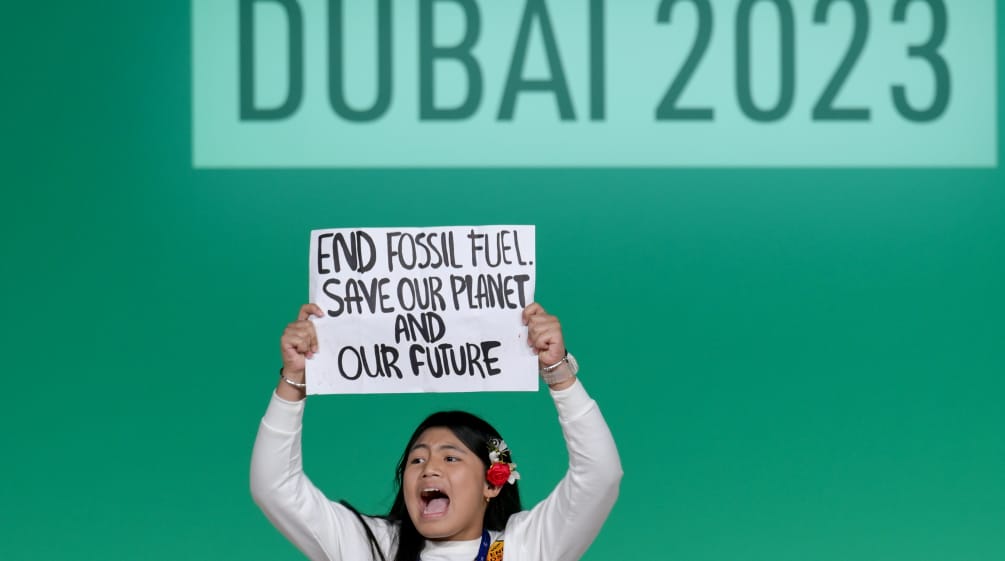COP 28 outcome falls short – bad news for people and nature
 Protest during COP 28 (© COP28 / Anthony Fleyhan)
Protest during COP 28 (© COP28 / Anthony Fleyhan)
Dec 14, 2023
The UN Climate Change Conference COP 28 in Dubai has ended in disappointment: The demand for an urgently needed phase-out of oil, gas and coal was reduced to a toothless “transition”. This is a terrible result, especially for the rainforests and their inhabitants.
On a more positive note, criticism of fossil fuels did in fact make it into the final agreement of a COP for the first time ever. The declaration speaks of “transitioning away from fossil fuels in energy systems, in a just, orderly and equitable manner”. This is “the beginning of the end” of the fossil fuel era, says UN Climate Change Executive Secretary Simon Stiell.
Even so, the declaration is soft and riddled with loopholes and falls far short of what would be needed to protect the climate: the rapid phase-out of oil, gas and coal. Governments and companies behind harmful oil and gas projects, for example in the Congo Basin and East Africa, could indirectly take this as encouragement – bad news for the rainforest.
One positive aspect is that money was pledged for loss and damage. Germany, for example, committed $100 million, bringing the total to around $800 million so far. However, this amount falls far short of what is needed, particularly in tropical countries that are already hard-hit by the climate crisis – bad news for rainforest communities.
A shortcoming of the declaration is that it highlights technologies that could lead to delays in measures to reduce greenhouse gas emissions. These include carbon capture and storage (CCS), which is extremely costly and not ready for deployment. The dangerous bogus solutions also include carbon credits, which can lead to large-scale land grabbing.
Tripling the production of renewable energies by 2030 sounds good. The question is how this will be implemented, as it could lead to a boom in biomass – i.e. the burning of forests – something that must be prevented at all costs.
Martins Egot, head of PADIC-Africa in Nigeria and a long-standing partner of Rainforest Rescue, on the “transition” from fossil fuels: “This allows emitters to remain in their business as long as they want.” Martins does not “perceive a strong commitment and willingness from the big countries to support that intiative. … We already have wonderful environmental policies on paper but not on ground … Environmental NGOs in Nigeria are engaged on a daily basis in protests against harmful environmental practices aided by agencies of government who know what the laws and policies say, and the heads of these government agencies are the ones attending the COPs and doing the negotiations.”
“I found most lobbyists used COP28 to promote the oil business, especially the host. I think the side of activists and environmental and human rights defenders as well as civil society achieved less,” says Maxwell Atuhura from the Ugandan organization Tasha, also a Rainforest Rainforest Rescue partner. “COP is gradually losing in meaning in climate change fights or struggles.”
Indonesian environmentalists criticize the fact that the protection of the rainforests, which are so important for the climate, clearly did not play a role at COP 28. In fact, the forests remain in danger due to false climate solutions such as the mining of raw materials for electric vehicles and carbon credit projects. “We strictly reject trading in carbon certificates. It is a threat to the rainforest and especially to Indigenous people,” says Franky Samperante of Pusaka, another Rainforest Rescue partner organization.
Climate damage caused by industrial agriculture – for example by clearing rainforest for plantations – apparently played no role in the negotiations, notes Rainforest Rainforest Rescue partner Muhammad Habibi from Borneo.
Forests and nature were essentially discussed outside the formal negotiations in Dubai. During “Nature Day”, the focus was on linking to the results of the UN Biodiversity Conference (COP 15) in Montréal in December 2022. In the final declaration, only two passages actually refer to forests. It does, however, contain the goal of halting deforestation by 2030.
As Prof. Mike Berners-Lee of Lancaster University told the Guardian, “COP28 is the fossil fuel industry’s dream outcome, because it looks like progress, but it isn’t.”
only two passages actually refer to forests
The exact wording:
41. Emphasizes the importance of protecting, conserving and restoring nature and ecosystems to achieve the Paris Agreement temperature goal, including through enhanced efforts towards halting and reversing deforestation by 2030, forest restoration, and through other terrestrial and marine ecosystems acting as sinks and reservoirs of greenhouse gases and by protecting biodiversity, while ensuring social and environmental safeguards, in line with the Kunming Montreal Global Biodiversity Framework;
42. Further notes the need for enhanced support, including through financial resources, technology transfer and capacity-building, for efforts towards halting and reversing deforestation by 2030 in the context of sustainable development and poverty eradication, in accordance with different policy approaches as per Article 5, paragraph 2 of the Paris Agreement, including joint mitigation and adaptation approaches for the integral and sustainable management of forests as an alternative to results-based payments, in the context of Article 4, paragraph 5 and Article 9 of the Paris Agreement;











